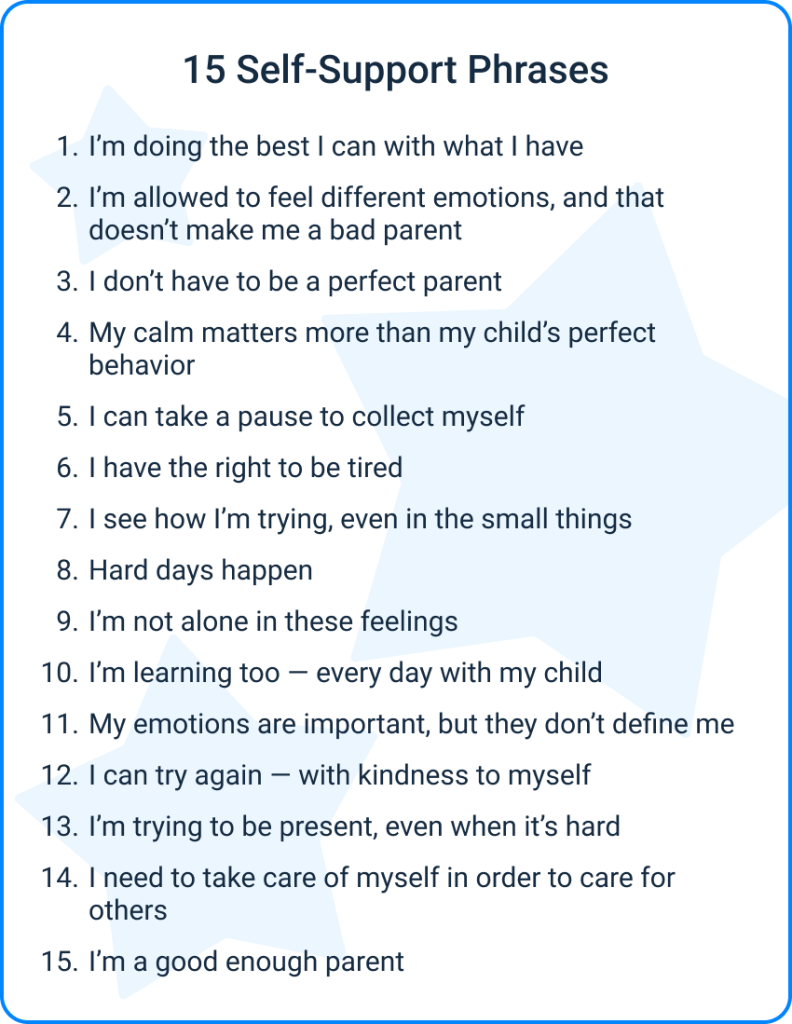15 Self-Support Phrases for Parents

Parenting isn’t only about caring for your child—it’s also about being attentive to yourself. Sometimes, a single kind word directed at yourself can become a lifeline on a tough day.
These 15 phrases can help you find your footing, even when things are difficult.
1. “I’m doing the best I can with what I have.”
You don’t have to be superhuman. You already give your child so much—your time, attention, and involvement. This phrase acknowledges your efforts and releases the idea of what parenting “should” look like.
2. “I’m allowed to feel different emotions—and that doesn’t make me a bad parent.”
Sometimes you’re tired, sometimes irritated, sometimes anxious, and all of that is okay. Your feelings don’t make you bad; they make you human.
3. “I don’t have to be a perfect parent.”
Perfect parents don’t exist. Children don’t need perfection; they need a real adult who is present. This phrase helps lift unnecessary weight off your shoulders.
4. “My calm matters more than my child’s perfect behavior.”
When your child is cranky, remember: your tone, your breathing, and your softness are more important than a “correct” reaction. Put your own oxygen mask on first.
5. “I can take a pause to collect myself.”
Sometimes the best way to be present is to take a step back. A pause isn’t leaving your child—it’s returning to yourself.
6. “I have the right to be tired.”
You don’t need to be full of energy 24/7. Tiredness is a signal: “I need support.” Hearing it is an act of love toward yourself.
7. “I see how I’m trying—even in the small things.”
Even in the chaos of the day, you find the strength to be there, comfort, feed, and hug. Noticing this means recognizing your own value.
8. “Hard days happen.”
Every parent snaps, gets tired, and struggles. It doesn’t mean you don’t love your child. It means you’re human.
9. “I’m not alone in these feelings.”
Millions of parents worldwide also doubt, worry, and wonder if they’re doing the right thing. You are among them. You are not alone.
10. “I’m learning too—every day with my child.”
You’re growing alongside them. You don’t have to know everything. You have the right to search, make mistakes, and try again.
11. “My emotions are important, but they don’t define me.”
Even if you feel angry or hurt in the moment, that’s not all of you. You are more than this emotion. Feelings come and go. What stays is your choice to keep caring.
12. “I can try again—with kindness to myself.”
Not with guilt, not with harsh self-criticism, but with gentleness: “Yes, I can try again. But softly. Humanly.”
13. “I’m trying to be present, even when it’s hard.”
And that’s what makes you a good parent. Not perfection, but the effort to stay connected. Even if it’s a little, it’s as much as possible in this moment.
14. “I need to take care of myself in order to care for others.”
You can’t pour from an empty cup. You also need care, and you have every right to it.
15. “I’m a good enough parent.”
Sometimes the voice in your head says, “I’m failing,” or “I’m doing it all wrong.” But the truth is—you’re trying, you’re present, you’re learning. You’re already a good enough parent. And that’s enough for your child to feel loved and safe.
Why it Works: What Research Says
Warm words directed toward yourself are not just pleasant phrases. They are a way to reconnect with yourself and activate inner resources that help you cope with stress and fatigue.
These phrases allow you to pause, take a breath, and feel grounded—making you more resilient in your relationship with your child.
- Research shows that parents with high levels of self-compassion experience less stress and burnout, and are more resilient and able to recover from difficult moments.
- Self-support phrases activate brain regions responsible for emotional regulation and help reduce physical tension and emotional overload.
- Parents who accept all of their feelings are more likely to choose a warm and attentive parenting style, and children feel calmer and more confident with them.
Kind words to yourself aren’t just comfort—they’re anchors that help you stay connected to yourself, value who you are, and remain present for your child, even in difficult times. Repeat them as often as you need. When you care for yourself, you are caring for your child.
References:
- Self-compassion as a resource in the parenting role, ResearchGate, 2025
- Exploring how parents of chronically ill children learn self-compassion, International Journal of Qualitative Studies on Health and Well-being, 2024
- The influence of parenting style and coping behavior on nonsuicidal self-injury behavior in different genders based on path analysis, Frontiers in Psychiatry, 2022
- Within‐ and between‐person relationships between spontaneous self‐affirmations, coping style, and wellbeing, Journal of Positive Psychology, 2021
Проверьте электронный ящик




















